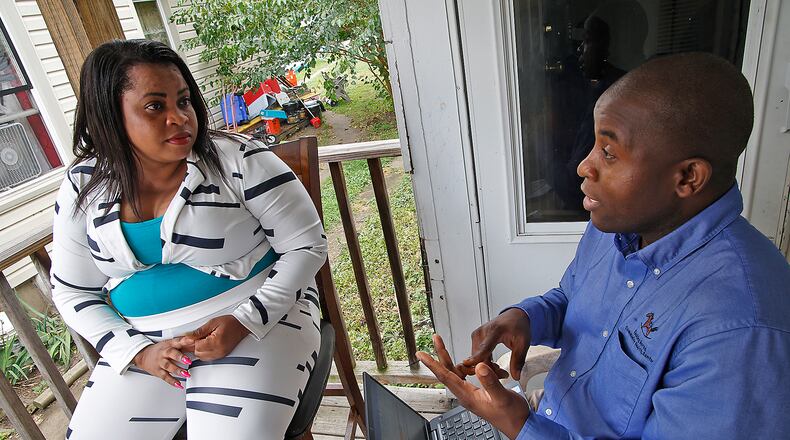This story is free
We've opened this story as free to help you experience the important and entertaining journalism we're producing. Here are some ways you can follow our work:
- • READ: Springfield City Hall, schools, county hit by bomb threat tied to Haitian issues
- • READ: Ohio bill would add criminal charges for auto crashes causing injury
- • SIGN UP: Get the news of the day delivered to your inbox every morning with our free Morning Briefing newsletter.
- • SUBSCRIBE: Like what you see? Explore all special offers here
Most are in the city legally and have or are eligible for Temporary Protected Status, a federal immigration designation that allows them to legally live and work in the U.S. Some have an asylum claim pending and, like immigrants across the nation, face a severely backlogged immigration system that is complicated and the subject of heated political rhetoric.
One big question: Why did Haitians start moving to Springfield in the first place?
Reporter Lynn Husley, who has extensively covered the Haitian community there, says this: “They are attracted to a community that has plentiful job opportunities and supportive services for them.”
Hulsey says sources she has interviewed report those who come to Springfield will tell their family and friends back home they can find affordable living in Springfield as well.
Our reporting also shows the Haitian population may be more around 12,000-15,000. That’s according to Mayor Rob Rue, who conducted a news conference in the city on Sept. 10. That number comes from the Clark County Health District and other partners.
The newspaper of record in the city is the Springfield News-Sun. Reporters and photojournalists there have been reporting on this topic for a long time. Here is a guide to some of that coverage.
>> Haitian immigrants in Springfield face complex immigration system and long delays
Some have an asylum claim pending and, like immigrants across the nation, face a severely backlogged immigration system that is complicated and the subject of heated political rhetoric. Congress is gridlocked on reforming the system, providing funding to expedite immigration cases and approving measures to try to stem the tide of new migrants crossing the southern U.S. border. MORE
>> Springfield’s Haitian population evolving from strangers to neighbors
Our reporter spoke to Haitian locals who say they try to block out any hate or anger thrown their way. They are preoccupied with the day-to-day demands of daily life: caring for their children, learning English and looking for work. MORE
>> Clark County refugee health clinic sees 60 patients in 2 months
A refugee health testing clinic was piloted with a few patients in April and became fully operational in May. It is a voluntary program open to immigrants who have been in the U.S. for 150 days or less to get healthcare screenings. It saw nearly 60 patients in the first two months. MORE
>> There was no evidence of goose-eating in Springfield
Clark County officials say there was one call to the dispatch center on this subject in 11 months and that law enforcement and ODNR found no evidence of it happening. MORE
>> Springfield City Hall, school, others hit by threats tied to Haitian issue
Springfield City Hall was evacuated around 8:30 a.m. Sept. 12 following a bomb threat “to multiple facilities throughout Springfield.” Drivers license bureaus in Clark County were also closed in relation to the threats, according to Clark County Clerk of Courts Melissa Tuttle. Mayor Rob Rue said everyone who was in the City Hall building was moved out and was safe. MORE
>> A wild few days: Springfield at heart of presidential debate, national discussion
Springfield being at the front of the national debate about immigration peaked with Donald Trump and Kamala Harris on the presidential debate stage Sept. 10, addressing viral, rejected claims that Haitians here were eating people’s pets. MORE
>> Springfield leaders reject recent wild Haitian rumors, focus on few key problems
After Springfield became fodder for the broader immigration debate as misinformation about Haitian immigrants garnered national attention, Mayor Rob Rue says the wild rumors have detracted from the needs of the schools, driving, housing and health care. MORE
>> Ohio AG rips Springfield immigration, eyes lawsuit; local leaders talk solutions
Ohio’s Republican Attorney General Dave Yost said his office will “research legal avenues to stop the federal government from sending an unlimited number of migrants to Ohio communities.” Without mentioning the word “Haitians,” Yost’s statement called the number of migrants to Springfield “absurd” and a “disaster.” He repeated social media claims about migrants stealing livestock, squatting in homes and killing wildlife for food, and said he hoped to take court action. MORE
>> How could Temporary Protected Status extension for Haitians affect Springfield?
The extension of temporary legal status for Haitians already in the United States will allow hundreds of immigrants in Springfield and the surrounding areas to apply to remain until February 2026. Temporary Protected Status allows an eligible person who receives approval to remain in the U.S. for a designated period of time but does not provide a direct path to citizenship. The Homeland Security secretary can grant temporary protection for different nationalities based on conditions in their home countries. The protection also allows them to apply for a work permit. MORE
>> Clark County leaders work to provide driving education for local Haitians
Clark County government and nonprofit leaders are working together to better educate Springfield’s Haitian immigrant population on how to obtain driver’s licenses and the rules of the road. Haitian immigrants in the area face challenges related to driving legally, including language barriers, a lack of resources describing the process available in Haitian Creole and significantly different driving conventions in Haiti vs the United States. MORE
About the Author

